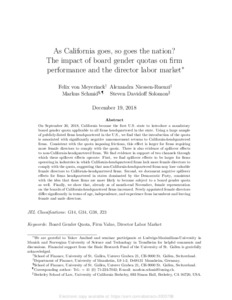|
As California goes, so goes the nation? The impact of board gender quotas on firm performance and the director labor market
Meyerinck, Felix von
;
Niessen-Ruenzi, Alexandra
;
Schmid, Markus
;
Davidoff Solomon, Steven
![[img]](https://madoc.bib.uni-mannheim.de/47638/1.hassmallThumbnailVersion/SSRN-id3303798.pdf)  Vorschau |
|
PDF
SSRN-id3303798.pdf
- Veröffentlichte Version
Download (2MB)
|
|
DOI:
|
https://doi.org/10.2139/ssrn.3303798
|
|
URL:
|
https://ub-madoc.bib.uni-mannheim.de/47638
|
|
Weitere URL:
|
https://ssrn.com/abstract=3303798
|
|
URN:
|
urn:nbn:de:bsz:180-madoc-476382
|
|
Dokumenttyp:
|
Arbeitspapier
|
|
Erscheinungsjahr:
|
2018
|
|
Titel einer Zeitschrift oder einer Reihe:
|
SSRN Electronic Journal
|
|
Ort der Veröffentlichung:
|
Rochester, NY
|
|
Verlag:
|
SSRN
|
|
Sprache der Veröffentlichung:
|
Englisch
|
|
Einrichtung:
|
Fakultät für Betriebswirtschaftslehre > ABWL u. Corporate Governance (Niessen-Ruenzi 2012-)
|
|
Fachgebiet:
|
650 Management
|
|
Abstract:
|
On September 30, 2018, California became the first U.S. state to introduce a mandatory board gender quota applicable to all firms headquartered in the state. Using a large sample of publicly-listed firms headquartered in the U.S., we find that the introduction of the quota is associated with significantly negative announcement returns to California-headquartered firms. Consistent with the quota imposing frictions, this effect is larger for firms requiring more female directors to comply with the quota. There is also evidence of spillover effects to non-California-headquartered firms. We find evidence in support of two channels through which these spillover effects operate: First, we find spillover effects to be larger for firms operating in industries in which California-headquartered firms lack more female directors to comply with the quota, suggesting that non-California-headquartered firms may lose valuable female directors to California-headquartered firms. Second, we document negative spillover effects for firms headquartered in states dominated by the Democratic Party, consistent with the idea that these firms are more likely to become subject to a board gender quota as well. Finally, we show that, already as of month-end November, female representation on the boards of California-headquartered firms increased. Newly appointed female directors differ significantly in terms of age, independence, and experience from incumbent and leaving female and male directors.
|
 
 | Dieser Eintrag ist Teil der Universitätsbibliographie. |
 | Das Dokument wird vom Publikationsserver der Universitätsbibliothek Mannheim bereitgestellt. |
 Suche Autoren in Suche Autoren in
BASE:
Meyerinck, Felix von
;
Niessen-Ruenzi, Alexandra
;
Schmid, Markus
;
Davidoff Solomon, Steven
Google Scholar:
Meyerinck, Felix von
;
Niessen-Ruenzi, Alexandra
;
Schmid, Markus
;
Davidoff Solomon, Steven
ORCID:
Meyerinck, Felix von ; Niessen-Ruenzi, Alexandra  ORCID: 0000-0002-9493-8280 ORCID: 0000-0002-9493-8280 ; Schmid, Markus ; Davidoff Solomon, Steven
Sie haben einen Fehler gefunden? Teilen Sie uns Ihren Korrekturwunsch bitte hier mit: E-Mail
Actions (login required)
 |
Eintrag anzeigen |
|
|
 ORCID: 0000-0002-9493-8280 ; Schmid, Markus ; Davidoff Solomon, Steven
ORCID: 0000-0002-9493-8280 ; Schmid, Markus ; Davidoff Solomon, Steven





 Suche Autoren in
Suche Autoren in